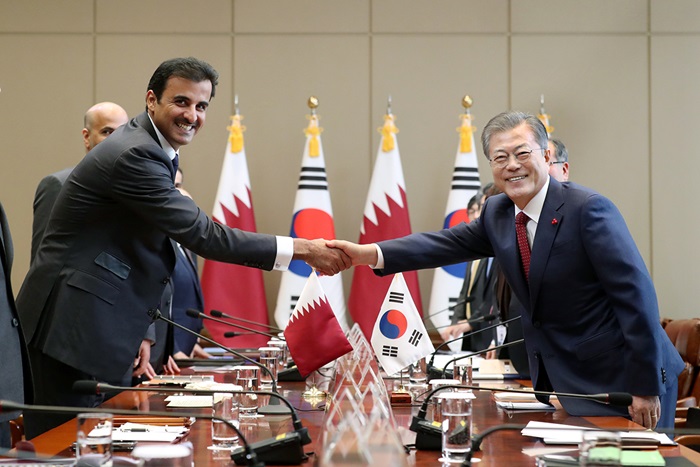The two countries established bilateral ties in 1974.
The past months have witnessed energy being placed at the top of the agenda of a number of meetings between Qatari officials and their international partners, as the liquified natural gas (LNG) giant moves towards dominating global production by 2030.
This matter is expected to be discussed in an upcoming visit by South Korea’s Prime Minister Kim Boo-kyum to the Gulf state. The significance of this visit comes as the two countries share a long history of bilateral trade, especially in the energy sector.
For years, Qatar has been a major source of LNG to South Korea as part of long-term contracts.
Qatar and South Korea’s overall bilateral trade reached $5 billion in the first half of 2021 alone, representing a 29% increase in comparison to 2020.
The energy sector makes up a significant part of trade ties between the two countries, with South Korea importing an estimated 38 mtpa (million tonnes per annum) of LNG from both Qatar and Australia.
Last year, Qatar’s LNG shipments to South Korea reached almost 10 mtpa, accounting for at least 30% of the country’s energy needs, rendering the Gulf state as South Korea’s largest LNG supplier.
More recently, data from January 2022 showed that South Korea came third place amongst Qatar’s Asian LNG buyers. The country had received roughly 661,000 tonnes from Qatar, as India came first with 1.2 million tonnes followed by China at an estimated one million tonnes.
Beyond its deliveries to South Korea, Doha and Seoul share several long-term agreements in the field of energy.
In July last year, Korean Gas Corporation (KOGAS), the country’s state-run company, signed a 20-year agreement with what was known as Qatar Petroleum at the time, before changing to QatarEnergy in October.
Under the agreement, KOGAS is set to purchase an additional two million tonnes of LNG per annum as of 2025, bumping the shipments to a total of 6.1 million. The deal came as the previous contract, worth 4.9 million tonnes, was coming to an end by 2024.
In 2012, Qatar’s Ras Laffan Liquefied Natural Gas Co inked a deal with KOGAS to supply the country with two million tonnes per annum of LNG, for 20 years as of 2013.
KOGAS had signed its first LNG deal with Qatar in 1995.
South Korea seeks Qatari mediation for release of Iran-seized oil tanker: reports
The deals are not limited to LNG, as QatarEnergy also signed an agreement with South Korea’s Hydrogen Convergence Alliance last year. Both Qatar and South Korea aim to develop hydrogen as a source of energy as the Gulf state explores low-carbon energy solutions.
North Field Expansion Project
Qatar is moving towards becoming the largest LNG producer by 2030 through its North Field Expansion project, which is the largest of its kind in the world.
The project is set to increase the country’s annual LNG production capacity from 77 million metric tonnes to 126 million tonnes by 2027.
The Gulf state has signed a number of major agreements with prominent companies to help bump up its production. Last year, Qatar ordered six LNG ships from South Korea.
The deal entailed the purchase of four ships from Daewoo Shipbuilding & Marine Engineering and two others from Samsung Heavy Industries. The orders are also part of a 2020 deal worth $19 billion.
Qatar had selected the companies to build more than 100 LNG vessels by 2027.
As both countries share strong bilateral ties and continue to embark on a long journey in the field of energy, the upcoming visit appears it may contribute to the development of Qatar and South Korea’s ties.
Follow Doha News on Twitter, Instagram, Facebook and Youtube







